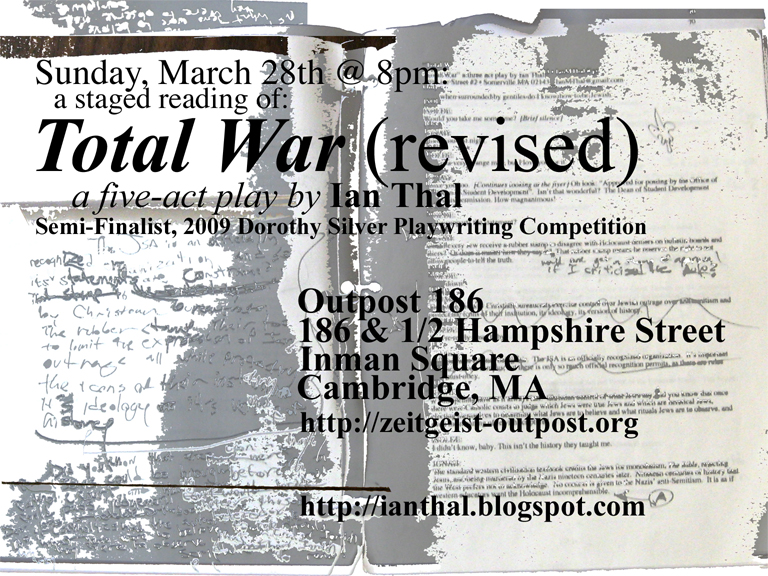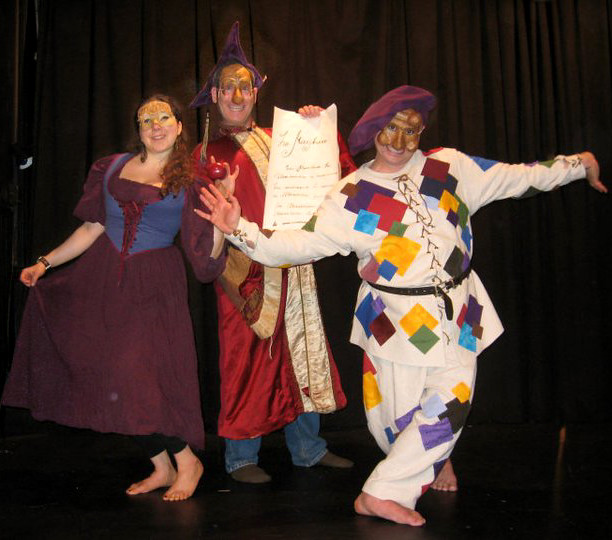
Teatro delle Maschere at Puppet Showplace Theatre: Stacey Polishook as Columbina, Eric Bornstein as Il Dottore, Ian Thal as Arlecchino. All photography by Cherie Konyha Greene
This is the photo of the troupe, and I stress troupe, while they are not the only ones involved (Jonathan Samson made a notable contribution over a period of only three days), Stacey and Eric have been my primary collaborators for since late August when we decided to create a new commedia dell'arte troupe, and I think we've created something special (sadly, Stacey is going is soon to be leaving to study abroad for a few months.)
What I really want to show you, however, is my new Arlecchino costume made by Cherie Konyha Greene. Some of you might recall my musing that I might need a new clothing for the hungry zanni who was always appearing in my kitchen when polenta served. Cherie immediately volunteered and we started sharing costume ideas. In dressing Arlecchino we wanted to factor in something closely resembling what an actual peasant of the Italian renaissance might have worn, and so we decided to start with the peasants seen in Francesco del Cossa's (ca. 1430- ca.1477 or 1487) fresco The Allegory of March or Triumph of Minerva:
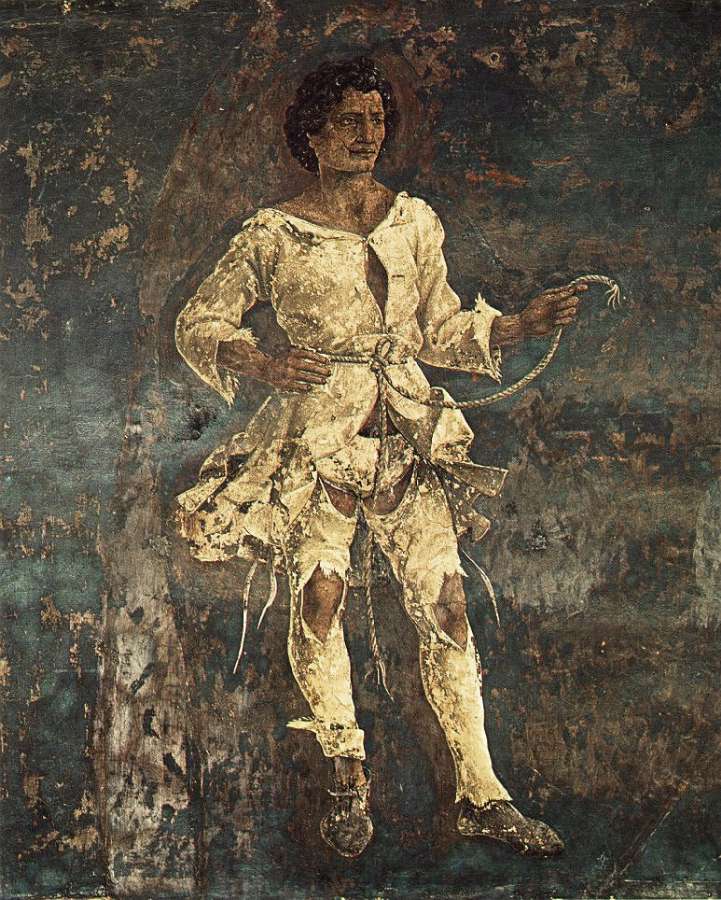
From there, I wanted something distinctive that would identify the costume as my Arlecchino. I got the idea of replacing the traditional diamond or triangle patterns with squares, while substituting the regularity with asymmetrical and overlapping patterns, drawing inspiration from Piet Mondrian:

Or Theo van Doesburg:

I gave Cherie some sketches and the results were this:
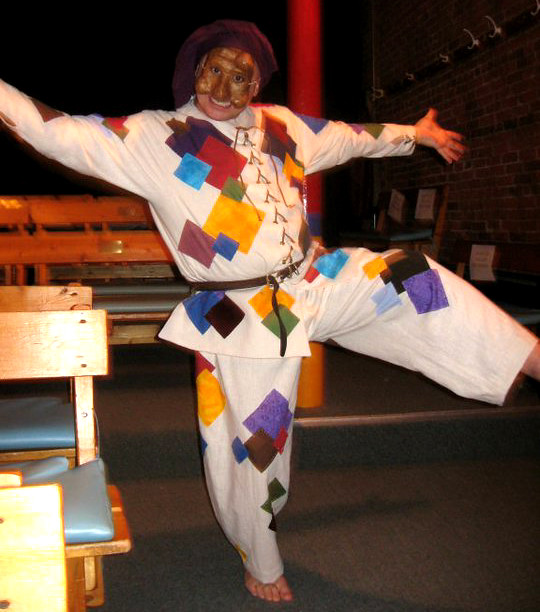
And from behind:
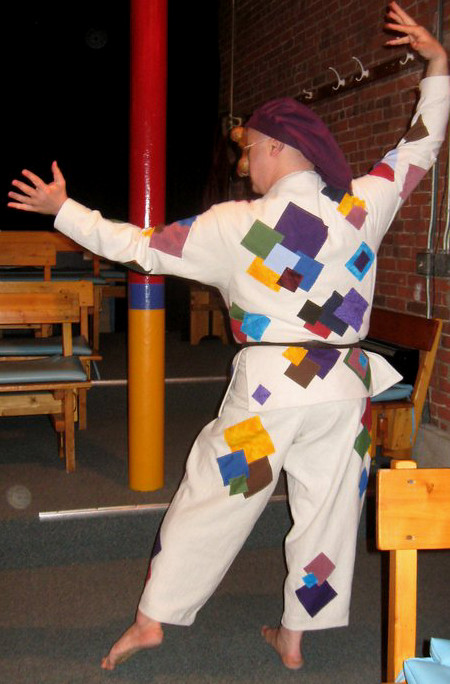
So spanning five centuries of art history!
Photography by Cherie Konyha Greene. Francesco del Cossa, Piet Mondrian, and Theo van Doesburg art courtesy of Wikimedia Commons.
Sunday, November 14, 2010
Teatro delle Maschere: Arlecchino's New Clothes
Posted by
Ian Thal
at
8:58 PM
0
comments
![]()
![]()
Labels: arlecchino, Cherie Konyha Greene, commedia dell'arte, Eric Bornstein, stacey polishook, teatro delle maschere
A New Experiment: Talkbackr
We're trying a new experiment. Did you see Teatro delle Maschere perform last night at the PuppetSLAM? Would you like to give us feedback on what you saw?
[N.B.: The Talkbackr page for this event has expired 3/1/2011]
Posted by
Ian Thal
at
10:51 AM
0
comments
![]()
![]()
Labels: PuppetSLAM, talkbackr, teatro delle maschere
Sunday, November 7, 2010
Teatro delle Maschere does the PuppetSlam: November 13, 2010
Teatro delle Maschere will be appearing at Puppet Showplace Theatre's PuppetSLAM this coming Saturday, November 13th at 8pm.
We shall be reviving The Esteemed Dottore of Bologna Offers His Authoritative, Erudite, and Thoroughly Supercilious Meditation on the Mask for those who missed it last time and for those of you who have seen it before: expect it to be just a little different! Different cast members result in different improvisations!
Dottore: Eric Bornstein
Columbina: Stacey Polishook
Arlecchino: Ian Thal
Puppet Showplace Theatre is at 32 Station Street, Brookline, MA
Tickets are $15, $13 for PST members and students. Facebook users can RSVP here
Posted by
Ian Thal
at
3:05 PM
2
comments
![]()
![]()
Labels: commedia dell'arte, Eric Bornstein, Puppet Showplace Theatre, PuppetSLAM, stacey polishook, teatro delle maschere
Saturday, October 23, 2010
Peter Schumann's [Judenfrei]-Christian Skies
It's been quite a while since I wrote a post about Peter Schumann or Bread and Puppet Theatre, but I just came upon the following quotation about Bread and Puppet's touring production of a truncated adaptation of Claudio Monteverdi's opera, The Return of Ulysses:
In order to commit genocide on their competitors, the Trojans, the tricky Greeks employ their multitalented sky, full of custom tailored divinities, to justify the crime, just as we employ our Judeo-Christian sky, occupied by a divine air force and permitted by the in-god-we-trust court system, to justify our atrocities in Afghanistan, Palestine and elsewhere. By order of Jove, the boss, and with special help from his daughter Minerva, Ulysses finally returns home, where he has to murder 100 evil suitors in order to be happily reunited with wife and property.
Some notes:
1.) Any student of Greek mythology knows that the Greeks did not use their gods to morally justify the actions of the Trojan War: both Trojans and Achaeans are portrayed as pawns of the capricious gods of Olympus while the war is portrayed as the consequence of the gods' petty rivalries. Schumann is playing fast and loose with the canon of western civilization just as he does with 20th century history.
2.) I find it interesting that Schumann refers to "our Judeo-Christian sky" but not to our "our Judeo-Christo-Islamic sky." This allows him to ignore acts of ethnic cleansing and genocide by Muslims upon Jews and Christian Arabs-- or between different sects of Islam or even between Muslims of different ethnicities. This also gets back to a conversation in November of 2004 (I was a fly on the wall) where Schumann insisted that Osama bin-Laden was simply an anti-Imperialist and dismissed any notion that bin-Laden was motivated by religious fundamentalism or intolerance.
3.) Speaking of which, Schumann does not, as usual, address his childhood growing up in the Nazi stronghold of Bresleau, or that his father was a Lutheran clergyman during the Nazi era, and Schumann never mentions whether his family supported Naziism or not: after all, this would be his first-hand knowledge of a Judenfrei-Christian sky. In other interviews and reminisces, Schumann speaks of an idyllic childhood of free play and fresh baked bread interupted the day that day Germany was defeated, Breslau was renamed Wroclaw and became part of Poland as he and his family were forced to move westward from the no longer Großdeutchland into the post-war Kleindeutchland. This is part of his overall pattern of presenting Germany as the victim of World War II as opposed to anyone Germany or its allies might have exterminated.
The shame is that Schumann is no longer able to adapt a classic work without linking it to his anti-Israeli animus (which personal interviews repeatedly show to be rooted in elegiac romanticism for his Nazi childhood) especially when he has shown great wit it adapting other works from the theatrical canon, such as his 2002 adaption of Bertold Brecht's and Kurt Weill's Die Dreigroschenoper as Dirt Cheap Opera.
Posted by
Ian Thal
at
6:26 PM
0
comments
![]()
![]()
Labels: Antisemitism, Bread and Puppet, Greek Mythology, Peter Schumann
Thursday, October 21, 2010
100 Hits for Teatro Delle Maschere
Today, YouTube reported the 100th viewing of the video of Teatro Delle Maschere's October 2 performance at Fort Point Theatre Channel's Exclamation Point Event. Not too shabby for a new theatre troupe, I say.
In the meantime, Kenny Steven Fuentes, whom I met after the show (he was there, in part, to see some of his compatriots from the CoLab Theatre Company perform Mark Harvey Levine's "Superhero") gave us a nice write up on the CoLab blog as part of his ongoing discussion on acting:
The characters are over the top, and flamboyant. But they don't seem strained. The performances are at ease, but not lazy. there is a balance between strength/energy and grace/lightness. Each character is specific, and no one seems like they're "Trying too hard." This is what I'm talking about when I describe the difference between Naturalism and Realism. This is far more natural than half of the realistic performances I see. Good acting isn't about being "Realistic". It's about being "Real".
Thanks, Kenny!
In addition, earlier this week, we presented at the Puppet Incubator at Puppet Showplace Theatre (masks are puppets, too), so expect to see us at the next Puppet Slam on November 13th!
You can visit the Teatro Delle Maschere fan page on facebook.
Posted by
Ian Thal
at
6:17 PM
0
comments
![]()
![]()
Labels: CoLab Theatre, fort point theatre channel, Kenny Fuentes, Mark Harvey Levine, Puppet Showplace Theatre, PuppetSLAM, teatro delle maschere
Friday, October 15, 2010
Jack Powers, 1937-2010
Jack Powers reading D.H. Lawrence, October 26, 1987.
On Thursday, October 14, 2010, the Boston poetry scene one of its elder statesmen, albeit a troubled and sometimes difficult elder statesmen. This hasn't been the first time I've devoted space to the passing of an artist who has influenced me (and probably won't be the last) but this is not the most pleasant of remembrances. I'm only glad that I had a chance to make peace with Jack Powers while he was still alive.
Much of what follows is not flattering but it's an essential part of the story. If you are looking for a hagiography, please look elsewhere. Outside of rumors and clichés, I am mostly limited to the two years and several months during which I was most closely affiliated with Jack. These two years were, in many ways, the beginning of a decline of a proud man who had done much to nurture poetry.
Jack Powers biggest influence on poetry scene was as founder and long time host of Stone Soup Poetry an open mic he started in 1971 as part of the Beacon Hill Free School. Jack was an evangelist for poetry: encouraging everyone to read, write, and speak poetry. Some of this early history would be recounted in a 1999 interview with ArtsEditor:
So we're sitting around this place saying: what can we name this place that will fit anyone? One of the suggestions was "Cakes and Ales," just because it sounded cute. And I said: well we won't have cakes or ales, so I don't think that's gonna work. Then I remembered this English folk tale. I thought "Stone Soup"—whatever you have to put in the soup is what it is.Stone Soup would outlive the Beacon Free School and move from one venue to another, and by the time I walked into a Stone Soup reading in the fall of 1999, it was located at the old Zeitgeist Gallery on Broadway and Norfolk in Cambridge. I was already a cocky "spoken word artist" reading at alternative art spaces and loft parties in between bands. I most certainly over estimated my abilities as a writer at the time, but Jack liked what I was doing and took me under his wing, suggesting I read certain poets (Ed Sanders and Gregory Corso are two who would become favorites), sometimes impulsively giving me hosting duties for the night, and encouraging a listening attitude that allowed me to grow as a writer.
However, there was a dark side to this story. Many old-timers on the poetry scene will say that the high point in Stone Soup's history was during it's 1990s stint at T.T. The Bear's. Others will say it was the 1980s at Charlie's Tap or the Green Street Grill. These were years when famed beats and bohemians like Corso, Ferlinghetti, Sanders, and Ginsberg as well as future Nobel Laureates like Seamus Heaney or Derek Wallcott, or future U.S. Poet Laureates like Robert Pinsky could be expected as features. Stone Soup had fallen on hard times, and much of that owed to Jack's increasingly obvious alcoholism. People who had known him for longer than I had, often had a vision of a man of dignity and compassion. Though his charisma was very much intact, by the time he took me under his wing he had begun to lose himself, and this was often why I was charged to take the mic.
In 2001 Stone Soup had moved from the Zeitgeist to the Middle East Downstairs. Even with a PA system, the room was simply too large for a weekly poetry reading. Only the biggest stars in poetry (or those with a gift for self-promotion) could fill a room that size. The fact that there was a bar in the room was also not good: though very few poets drank at readings, the bar was too much of a temptation, and often he would be too inebriated to handle the hosting duties.
There were some who were becoming concerned about the line of succession, and some of them perceived me as the natural protégé, and though I never wanted this role this talk certainly got back to Jack and by then no amount of apologizing could repair the damage that rumors had created. Things got worse when the management of the Middle East determined that after seven months, Stone Soup was simply too unprofitable to stay on their schedule. I don't know if this was ever communicated to Jack but Jack never told us. I intuited that our relationship with the Middle East was deteriorating and checked the schedule, learning that we had been replaced on the schedule with the Middle East's bread and butter: live music; those audiences were more likely to buy drinks.
By this time, I was part of the board of directors of the organization. In the face of the news, Jack was incommunicative. No one else knew what to do. I quickly found Stone Soup a new home at the Out of the Blue Gallery where, as of this writing, it remains, but I wasn't able to shake the accusations that I was "trying to take over." Over the next few months, Jack would often show up late to the reading, sometimes as much as an hour late, or not show up at al, often leaving me to host.
Finally, at a New Years' Eve reading to mark the end of 2001 and the beginning of 2002, Jack awoke from being passed out on the couch and launched into a long string of verbal abuse at me. This was only one aspect of the evening's unpleasantness as the featured poet and musician, had also decided to show up drunk for the gig, and was herself nodding off during her set (thankfully, this artist did quit the habit a few years later.) That was the point where it dawned on me that bohemia is often very willing to watch its finest citizens self-destruct in slow motion, almost as if it were a long-form performance art piece (and sometimes they would applaud.)
The following week, I quit. Stone Soup would go on without me. A long time denizen of the scene explained it simply: Jack had a pattern of finding himself a younger protégé and giving him more and more responsibilities until Jack finally grew to resent the help. I was not the first and I would not be the last.
My time was not a complete loss. In those years, I had learned a great deal about poetry, and made many friends. My friendship with William J. Barnum and James Van Looy began as a result of my time at Stone Soup led to my studying mime, and the formation of Cosmic Spelunker Theater. For James, who had been a friend of Jack's going back to the 1970s, this venture was a healing process for both of us.
Jack had come to one of Cosmic Spelunker's shows in 2003. I am told he had been moved by the performance, but he and I were unable to reconcile at that point in time.
Chad Parenteau, a friend going back to the spoken word scene of the late '90s, eventually took over the role of the youthful protégé. By this time, Jack had been in and out of rehab programs, but the addiction had lead to a series of strokes. The resulting brain lesions had seemingly killed Jack's addiction and his rage, but had also robbed him of his ability to speak and gesture with his face. Chad had taken it upon himself to repair the schisms that had occurred in the poetry scene over the years and repeatedly cajoled me into coming back.
This eventually happened in 2008, when Chad convinced Bill, James, and myself to reunite Cosmic Spelunker and perform at Stone Soup. Afterwards, the now silenced Jack expressed his appreciation with exuberant gestures. He had become physically very expressive in the years following the stroke. His need to communicate with the world and his refusal to close himself off from any art form had made him embrace mime: we made eye contact and I realized in that moment that all past feuds were over. Chad would have me come back the following year to perform Arlecchino Am Ravenous. Chad was called out of town for work, but I remember Jack thanking me after the show.
I saw him one more time after that when we both came to pay our respects to Brother Blue.
Good-bye, sir: I'm glad we were able to patch things up before the end.
Posted by
Ian Thal
at
5:58 PM
6
comments
![]()
![]()
Labels: Chad Parenteau, cosmic spelunker theater, Jack Powers, James Van Looy, obituary, Out of the Blue, poetry, stone soup poetry, William J. Barnum
Thursday, October 7, 2010
Department of Mistaken Identity
Web Chronicles, which appears to be some sort of automated news websearch aggregator has a page devoted a page to photographs and gossip about far more famous fellow actor, Eric Thal.
A man of a thousand faces, but none of them are Eric Thal.
As near as I can tell, despite the shared surname, we are not even related: The Thals from whom I am descended are Lativian Jews from the region of Courland, while according to an interview I once read after somebody reasonably asked, Eric, if I may be so familiar, despite playing a Hassid in A Stranger Among Us (1992), is not of Jewish descent: his Thals are ethnic Germans.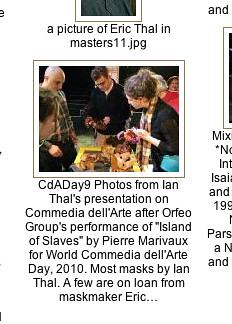
Eric Thal is not to be confused with Il Capitano, a stock character of the commedia dell'arte
Photos are from a presentation for World Commedia dell'Arte Day as a guest of Orfeo Group, and from a performance at Behind the Mask Theatre.
See also: Ian Thal and the Doppelgängers
N.B. 5:24pm: Kevin Fitzgerald, who took the photograph of me wearing the Arlecchino mask, has suggested that:
"You should show up as [Eric Thal] sometime and play one of his roles.To which I countered:
According to the web page, I should be showing up for his dates with Charlize Theron, though that might be awkward since I don't think I've seen any of her films.And:
"Oh Charlize, let's not talk about our film work. Let's talk about my passion for commedia dell'arte and mime!"
I bet Charlize Theron eats at fancy restaurants where this poor zanni can't even afford the appetizers. This little confusion may work out nicely for me.
Posted by
Ian Thal
at
7:46 AM
1 comments
![]()
![]()
Labels: Behind the Mask, commedia dell'arte, doppelgänger, Eric Thal, Ian Thal, Orfeo Group
Monday, October 4, 2010
Teatro delle Maschere From Another Angle
After viewing the video I posted yesterday of Teatro delle Maschere's October 2nd performance. Anya Malkina, a friend, graphic designer and web designer who has done work for Behind the Mask Studio & Theatre and had shot photos ofa recent performance of Arlecchino Am Ravenous, sent in this video she took of the second half of our performance, but from stage left.
What I find fascinating about comparing the two videos is how the comparison illustrates that unlike film or television, which, have evolved , theatre is a three-dimensional art form. In this particular clip, even when the Dottore (Jonathan Samson) is obscuring Columbina (Stacey Polishook) and Arlecchino (myself) one can see the two servants' shadows dancing on the back wall.
Posted by
Ian Thal
at
11:33 PM
0
comments
![]()
![]()
Labels: Anya Malkina, arlecchino, Behind the Mask, commedia dell'arte, Eric Bornstein, fort point theatre channel, Ian Thal, Jonathan Samson, stacey polishook, teatro delle maschere, theatre
Sunday, October 3, 2010
The Premiere of Teatro delle Maschere
In case you missed last night's show.
The Esteemed Dottore of Bologna Offers His Authoritative, Erudite, and Thoroughly Supercilious Meditation on the Mask
Stacey Polishook as Columbina, Jonathan Samson as Il Dottore, and Eric Bornstein on sound effects. Yours truly as Arlecchino.
Notes:
Stacey, who is both an apple fiend and puppeteer, came up with the Appelina lazzo, which I feel makes for a unique interpretation of the Columbina character.
Jonathan had only flown in from Bangkok earlier that week and had begun rehearsing with us only two days before. Before that, Eric had been playing the role of Il Dottore, in rehearsals (we promise to have him on stage as an actor very soon!)
Grazie to Fort Point Theatre Channel for presenting us as part of the evening's program, Eric for being the catalyst behind the formation of Teatro delle Maschere, Behind the Mask Studio & Theatre for hosting our rehearsals, Toni for her opinions on matters Italian, and Jonathan's father for aiming the camera!
If you enjoyed the show, please become our fan on facebook!
Posted by
Ian Thal
at
12:43 PM
0
comments
![]()
![]()
Labels: Behind the Mask, commedia dell'arte, fort point theatre channel, Jonathan Samson, stacey polishook, teatro delle maschere, video
Thursday, September 9, 2010
October 2nd: Teatro Delle Maschere @ Fort Point Theatre Channel + Preview!

Teatro delle Maschere, my new commedia dell'arte troupe with Behind the Mask Studio & Theatre, will be presenting a short scenario. The Esteemed Dottore of Bologna Offers His Authoritative, Erudite, and Thoroughly Supercilious Meditation on the Mask as part of Fort Point Theatre Channel's Exclaimation Point! 8: Masks on Saturday, October 2 at 7pm at Art at 12 Gallery, 12 Farnsworth Street in Fort Point, Boston. It will be a free show. Facebook users can RSVP here.
The cast will include Jonathon Samson (of Teatro Commedia) as Il Dottore, Stacey Polishook as Columbina, and myself as Arlecchino.
Teatro Delle Maschere will also be performing a preview this Saturday, September 11th 7pm at Behind the Mask's outdoor stage at 6 Campbell Park Place in Somerville. Eric Bornstein will be playing Il Dottore, otherwise the cast will be the same. Facebook users can RSVP here.
The scenario is created by Stacey Polishook, Eric Bornstein, and myself.
Teatro delle Maschere has a Facebook Page!
Posted by
Ian Thal
at
10:16 PM
0
comments
![]()
![]()
Labels: Behind the Mask, commedia dell'arte, Eric Bornstein, fort point theatre channel, Jonathan Samson, stacey polishook, teatro delle maschere
Sunday, September 5, 2010
Moral Inversion and Party Invitations
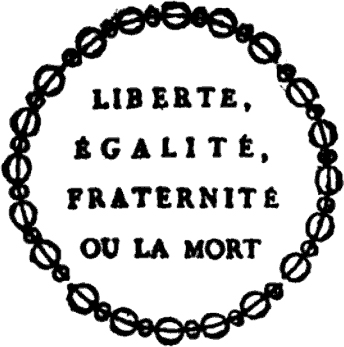
I do not typically address politics or social etiquette in this blog, yet at the same time, I rarely refrain from doing so.
This weekend I attended a party. At one point I was accosted by an acquaintance, perhaps the last stalwart of Boston's loony-left who still engages me in a friendly manner. Note: I am using "loony" in reference to a tenuous grasp on reality, logical coherence, and facts combined with a tenacious grasp on the party line of the faction of one's choice: I regard the left's guiding principles of liberté, egalité, fraternité [et sororité] as valid.
This acquaintance stated that he had told a friend about the party, and that I had some past conflict with this friend and wanted me to behave myself and not cause trouble. Those of you who are unfamiliar with my reputation for starting altercations at parties needn't worry: There is no cause for such a reputation. So who was this tag-a-long?
This guy:

This is David Rolde protesting an April 26, 2009 staged reading of my play Total War. Notice that he's a Hamas supporter and that he opposes a two-state solution to the Israeli-Palestinian conflict. Also notice that Total War does not discuss any aspect of the middle east conflict beyond a single line of dialogue. I recounted this bizarre incident in greater detail:
The oddest thing about Rolde's "protest" was that Total War is not about any aspect of the Middle East conflict: it's about Jews and Catholics. However, this did not stop Rolde from shouting "Jewish murderers!" as nauseum in a whiny voice while partially blocking the footpath between Outpost 186 and the sidewalk. I suppose he takes his street performance anywhere there might be an event that could be termed "pro-Jewish."
Eventually, I decided to invite him inside to attend the reading. Predictably, since it would have required him to have sat down and quietly listen to actors reading dialogue for a couple of hours, he did not accept.
So why the personal animus directed towards the playwright?

Here's a photograph from an earlier encounter, October 7th, 2007 at a rally for the people of Darfur who have been been murdered and displaced by the Sudanese government and the militias it supports. The speakers were survivors of a number of the 20th century's most infamous genocides and mass murders, who despite there different ethnicities, religions, native-languages, and country of origin had come both to share their own experiences but also to speak out against the horrors in Darfur.
Rolde and company were not only holding up a crudely painted cartoon which seems to insinuate that Israel engineered the September 11th attack on the World Trade Center, but also heckling the speakers, many of whom had lost their entire families to genocide before coming to the United States, often calling these survivors "liars." They believed themselves to have come to protest "a racist pro-war rally against Sudan organized by the [...] Jewish Community Relations Council of Greater Boston."

And so, here I was at a party where there was an expected party-crasher with a past of heckling genocide survivors, supporting terrorism, spreading hatred and conspiracy theories, yet, I was the one being asked to not cause any trouble.
"So, Dan, have you ever known me to start an altercation at a party?"
"No, but..."
"David does some evil stuff and you're asking me to behave myself?"
"Well, he has no self-control and you do."
"Then maybe you shouldn't be inviting people like that to parties, or think about the friends you keep."
"Sometimes he drives me places."
It seems to almost like an allegory or a satire or perhaps a farce.
In the end, Rolde never actually showed up.
Posted by
Ian Thal
at
9:34 PM
8
comments
![]()
![]()
Labels: Antisemitism, David Rolde
Wednesday, September 1, 2010
Teatro Delle Maschere!
A few weeks after I performed Arlecchino Am Ravenous at Behind the Mask, Eric Bornstein made a proposal. He had been wanting to work on masks depicting the characters of the commedia dell'arte but had not found an avenue to do so. His proposal was to form an in-house commedia troupe with me as artistic director and dubbed it Teatro Delle Maschere.
Eric, Stacey Polishook and I have been developing a short piece which we will be performing various venues this autumn. More to come!
Posted by
Ian Thal
at
6:31 PM
2
comments
![]()
![]()
Labels: Behind the Mask, commedia dell'arte, Eric Bornstein, stacey polishook, teatro delle maschere
Photos from Arlecchino Am Ravenous at Behind the Mask Studio and Theatre
Another belated post.
A few photographs from my performance of Arlecchino Am Ravenous at Behind the Mask Studio & Theatre. Eric Bornstein had invited me to perform the inaugural show on the outdoor stage that was built earlier this summer. It was a sunny and the middle of the day, the show had been announced only two days before but we still managed to fill a good many seats.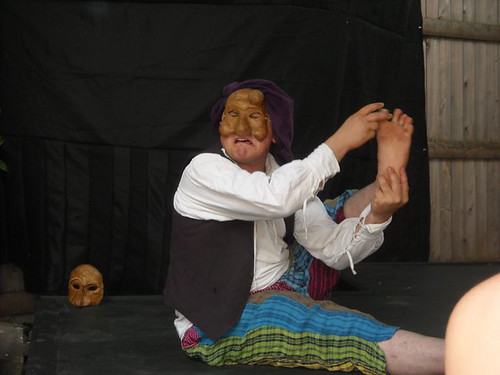
Here, Arlecchino tells the story of the five little piggies. Photo by Kevin W. Fitzgerald who happened to be visiting from Brooklyn.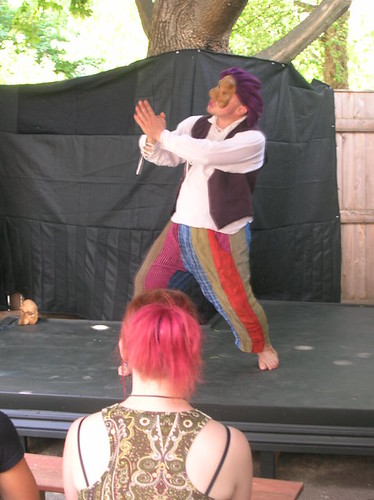
Arlecchino prays. Photo by Anya Malkina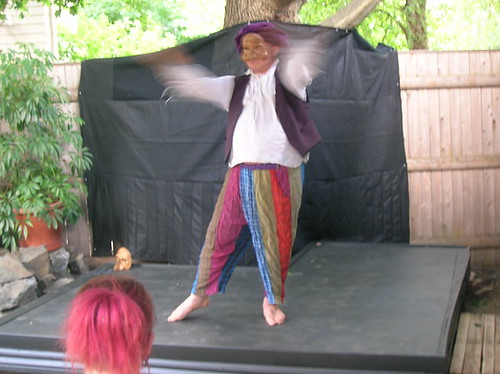
Photo by Anya Malkina
After an interesting Q&A during which Bill Marx asked some good questions comparing my usage of the old lazzo, "La Fame dello Zanni" versus that of Dario Fo's, we broke for a light lunch and I went off to supervise my students' rehearsals at Open Air Circus.
This leads to an important announcement that I will make in the next blog entry.
Posted by
Ian Thal
at
5:49 PM
0
comments
![]()
![]()
Labels: Anya Malkina, arlecchino, Behind the Mask, Bill Marx, commedia dell'arte, Dario Fo, Eric Bornstein, kevin W. Fitzgerald
Tuesday, July 27, 2010
This Weekend: OpenAir Circus Goes to the Beach
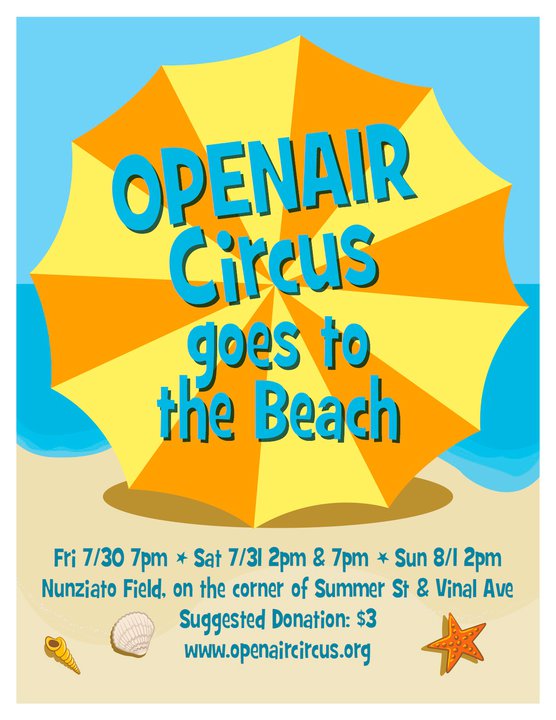
That's just the theme of the show. OpenAir Circus is performing at Nunziatio Field in Somerville as always.
My mime and commedia students will be performing as part of the annual Somerville-based youth circus. I've even made new masks!
Come see over 170 children of all ages (and a few adults) perform what they have learned this summer! The show is approximately 2 hours long with one intermission. Refreshments, souvenirs and circus equipment will be available near the entrance to Nunziato Field.
Showtimes:
Friday, July 30st at 7pm
Saturday, July 31st at 2pm and 7pm
Sunday, August 1st at 2pm
Suggested Donation: $3.00
If you like RSVPing on Facebook, you can do so here.
Posted by
Ian Thal
at
8:48 AM
2
comments
![]()
![]()
Labels: commedia dell'arte, mime, Open Air Circus, performance, teaching
Arlecchino Am Ravenous at Behind the Mask Studio and Theatre

I'll be performing Arlecchino Am Ravenous as a free outdoor performance at Behind the Mask Studio and Theatre on Wednesday, July 28 at 1pm.
Master maskmaker Eric Bornstein had originally asked me to perform as a demonstration to his assistants (and to inaugurate the small outdoor stage they built this summer) and then decided to open the event to a larger audience.
Behind the Mask Studio & Theatre
6 Campbell Park Place
Somerville, MA
(Enter around back. Please use public transit if possible: it's a short walk from the Davis Square MBTA stop.)
If you like to use facebook, you can RSVP here
Posted by
Ian Thal
at
8:18 AM
0
comments
![]()
![]()
Labels: arlecchino, Behind the Mask, commedia dell'arte, Eric Bornstein, mask
Sunday, July 25, 2010
Arlecchino Am Eating Polenta!

Everytime I make polenta, this character appears in my kitchen.
Perhaps I should use this or a similar image next time I perform Arlecchino Am Ravenous? Now if only I knew how to make costumes or could afford a more traditional Arlecchino costume.
Posted by
Ian Thal
at
11:22 PM
0
comments
![]()
![]()
Labels: arlecchino, mask
Saturday, July 24, 2010
Improvising with Karen Montanaro

Ian with Karen Montanaro. All photographs by Justin Moore, check his Flickr page for additional photos from the July 10, 2010 Improv Org Event
I met Karen Montanaro this past spring at the Arlington Center for the Arts where she was performing a set of improvisations to the music of Ginger Ibex a chamber music/progressive rock ensemble featuring pianist/composer, Sharon Crumrine and violist Betty Widerski. I had met Sharon in a coffee house where I had been auditioning actors for a staged reading of Total War, apologizing if my reading lines with actors was disturbing her, where upon we she mentioned her band, it came up that we knew many of the same musicians and that I was a mime.
That's when Sharon asked me if I knew Karen Montanaro. I only knew Karen by reputation and as co-author with her late husband, the celebrated mime, Tony Montanaro, of Mime Spoken Here. One of the best books I've read on mime theatre, which is probably one of the reasons I never got my copy back after I loaned it out!
Months later I found myself in Arlington. Having arrived early, Karen recognized my willingness to get on a stage and invited me to sit in with her ad hoc ensemble that this evening included the twin dancers Billy and Bobby McClain. We had a good rapport and so I stayed on stage for much of the show.
Mali Sastri, composer and singer for Jaggery was also in the audience that night. Not only did she join in improvisation, but it inspired the theme of her next Org event: Improv Org. Org is a series of performance related events at a location I shall not disclose that Mali organizes-- and she prefers to keep to a theme. I'd like to think that the city has many many more such "secret" event series for artists to perform in between public appearances.
With Johanna Bobrow who was sitting in on violin with Ginger Ibex that evening.
So sometime later, after Mali had started to put together the line-up, Sharon emailed and asked me if I would like to dance with Karen again. I agreed immediately, and along with Naomi Davis, became part of Karen's ad-hoc dance troupe. We were originally scheduled to perform in the garden, but because of flash floods that hit the Boston area that day, we were relocated indoors to the attic loft known as the Cloud Club.
From top to bottom: Johanna Bobrow, Ian Thal, Naomi Davis, the other part of Karen's ad-hoc dance troupe.
In between songs, Karen would often discuss her philosophy of improvisation: that no matter the body type or the level of training, each and every body had a certain poetry that could express itself if simply allowed to move. Eventually, she brought members of the audience to improvise with us.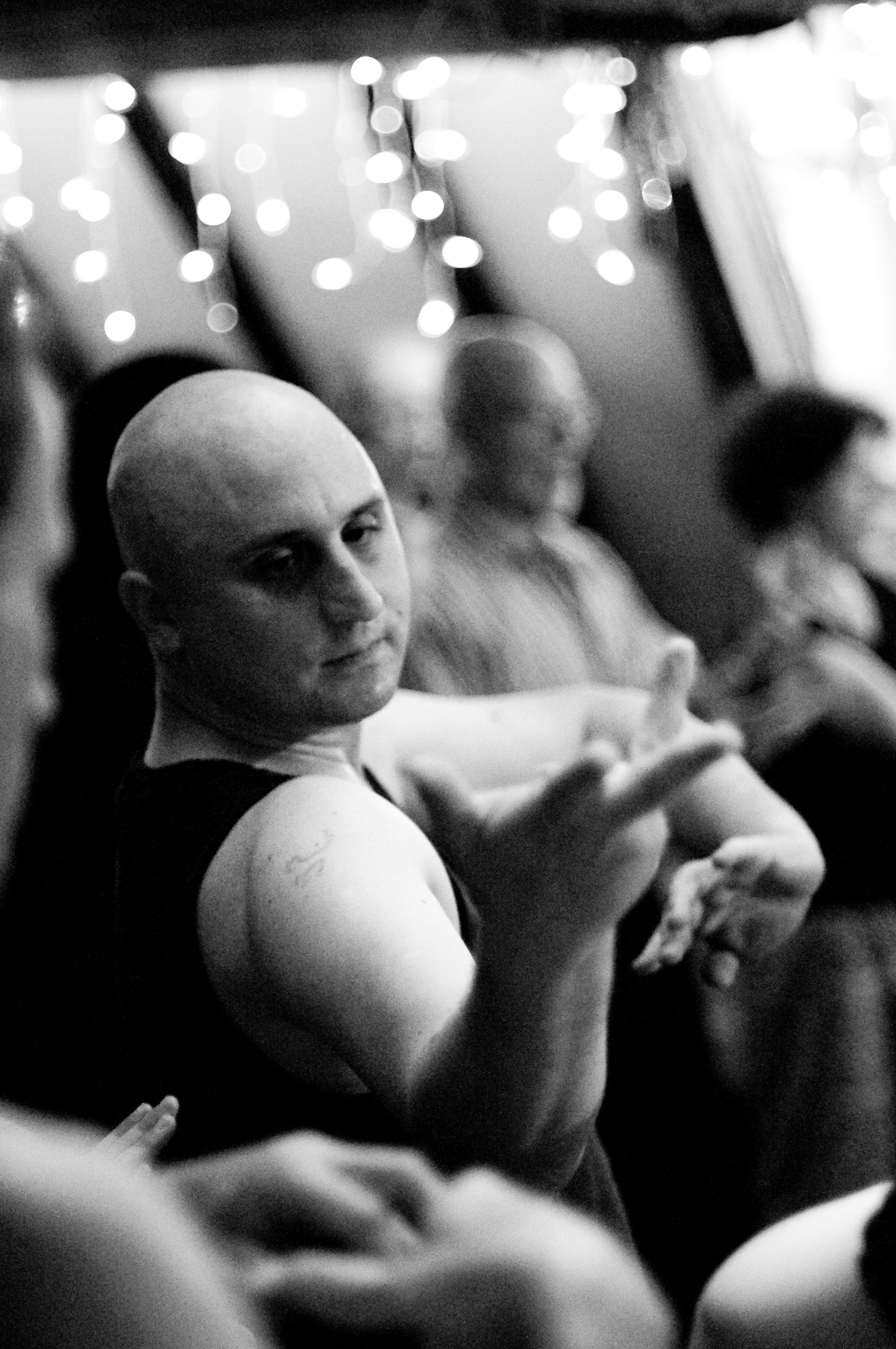
The evening would include a story by Evan O'Sullivan, a raga sung by Molly Zenobia, Guitar Circle New England and a jam featuring members of Walter Sickert and the Army of Broken Toys, Jaggery, Amanda Palmer and others.
Posted by
Ian Thal
at
10:08 AM
0
comments
![]()
![]()
Labels: Betty Widerski, dance, Ginger Ibex, improvisation, Justin Moore, Karen Montaro, mali sastri, Naomi Davis, Sharon Crumrine
Monday, July 19, 2010
Shadow Circus at Wheelock Family Theatre
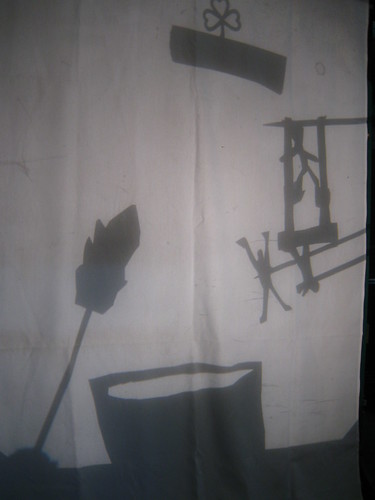
This summer I had a week-long gig co-teaching a puppetry class at Wheelock Family Theatre. It was my first time teaching puppetry. For two hours and forty-five minutes a day over the course of five days, my co-teacher, two assistants, and I, met with a group of roughly two-dozen nine-to-eleven year olds. Our objective was to teach them both puppet making and puppet performance. For me one imperative was that the kids came away introduced to at least three styles of puppetry and the associated techniques-- the other was that they created the work themselves.
On day one, we introduced them to the construction of rod puppets, and gave them the homework assignment to bring in a found object that would be modified into puppet. On the third day, I introduced them to shadow puppets using an overhead projector (a style of shadow puppetry covered extensively in Theatre on a Tabletop: Puppetry for Small Places by Kuang-Yu Fong and Stephen Kaplin of Chinese Theatre Works)
(All photos by yours truly while I was operating the overhead projector.)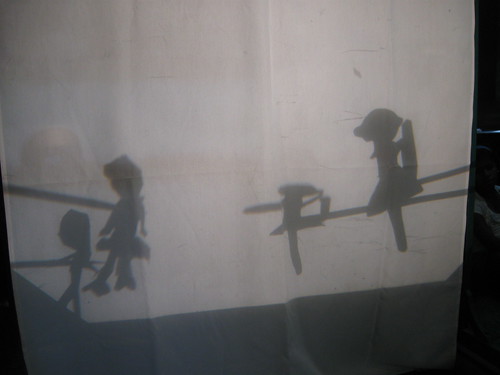
The kids were split into teams of three and sent to create circus-themed acts, which proved to be some of the most well-received aspects of the show they gave on Friday.
And now, a human tower on a unicycle!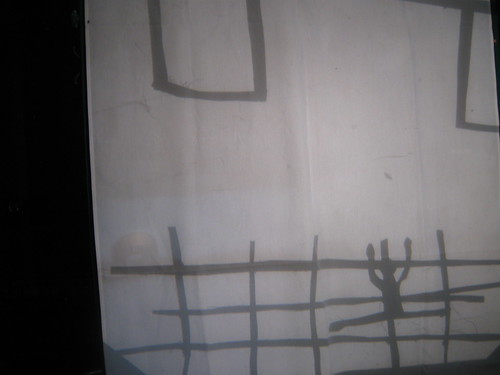
Don't worry, folks: we have a net!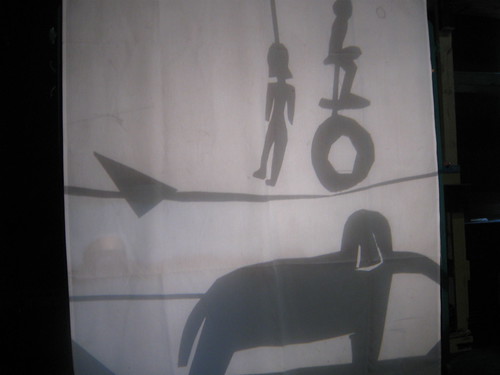
A tight-rope, a unicycle, and an elephant!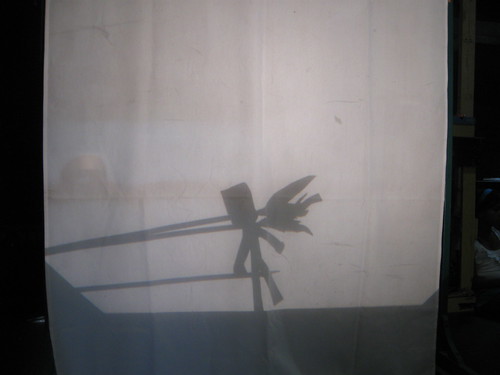
And now, ladies and gentlemen! The fire-breather!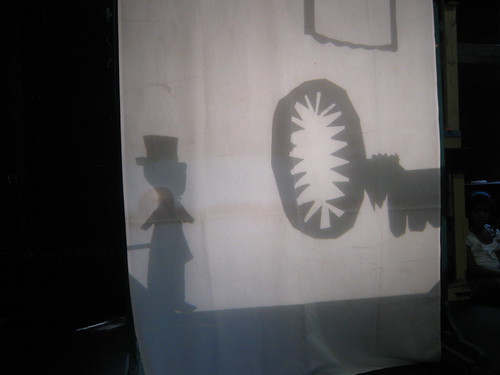
Can the most fearsome of beasts jump through a hoop of the most fearsome of elements?
Posted by
Ian Thal
at
8:50 PM
1 comments
![]()
![]()
Labels: Chinese Theatre Works, Puppetry, Shadow Puppets, teaching, Wheelock Family Theatre
Saturday, July 3, 2010
For Independence Day Weekend: A Repost from 2004
For Independence Day Weekend, a repost from my old authorsden blog from 2004 about the first performance of a piece that would later be incorporated into Cosmic Spelunker Theater's Waltzing to War:
Our National Anthem/Back in the USA
1/30/2004 4:24:55 PM
Tuesday, January 20th:
Once again, I am at my monthly regular gig at Whimsy, a free form performance art cabaret at the Zeitgeist Gallery in Cambridge. It was started by Warren Lynch when he was still going by the moniker of Thistle Kachunk and before he decided to devote his time to making low budget fantasy films. Whimsy bounced around from place to place for about a year before Warren got tired of it. More recently Markus Nechay decided to try his hand hosting the series.
Markus is one of Cambridge's eccentrics, a scruffy blonde fellow who immigrated from Communist Poland as a child and has a penchant for dressing in historical costume at every opportunity. Every opportunity includes Whimsy, where he chooses a historical era or theme and along with his cohost, Nick, free associates on one era or another in between featured performers. One evening the theme was pirates, another it was western pioneers, another was his childhood escape from the workers' utopia on the back of the American bald eagle (played by yours truly -- this took some rehearsal as I needed figure out how to flap my arms like wings while carrying an average sized adult male on my back.) Tonight's theme was "Dead Presidents" as we were competing with the State of the Union Address for the Cambridge audience. Markus had assembled a cast that included Abraham Lincoln, Chester B. Arthur, Ronald Reagan and Richard Nixon.
Given that "dead presidents" is slang for money, the most obvious performance piece I had in my repertoire was "Open Letter to the Treasury Department" in which I petition the creation of a "thirteen dollar bill" dedicated to Thelonious Sphere Monk-- it's a comic piece I wrote back in 2000 and was influenced by the monologues of Lenny Bruce and Lord Buckley whom at the time I listened to a great deal. While my poetry has since taken another direction, I had continued to perform the piece with Cosmic Spelunker Theater as part of "Give and Take."
In its latest incarnation, I open the piece with one my signature routines: I mime playing various musical instruments, either mimicking their sounds or scat singing. In this case I open with a bass solo. My intention had been to play "Epistrophe" but for some reason I find myself playing "Straight, No Chaser”. I have always, and now more so than ever, been fascinated by the physicality of musicians-- especially jazz musicians: When they play, their hands, and everything else that comes in contact with the instrument is disciplined, precise, and focused while every other part of their body expresses their individuality: differing postures, how they react to the crowd and the music around them. As such, I have not only had to learn the isolations and fixees that make the illusion of trumpets or double basses, but I have to create the musician personae-- these characters have slowly become larger and larger...
Just a couple of days before the performance, I feel some tug to do something more than the comic-- to once again do something on stage that my audience would not expect. I have made the demand upon myself as an artist to not allow anyone who has not seen my act in over a year to have an accurate measurement of my current work and so it is time to experiment again.
While visiting my parents in Washington, we chanced upon a radio interview with cellist Matt Haimowitz during which he performed his acoustic cello rearrangement of Jimi Hendrix' electric guitar arrangement of "The Star Spangled Banner." I was particularly awed by Haimowitz performance. It was Hendrix’s performance of this song in the film “Woodstock” that inspired me as a teenager to strap on a guitar, and while I have changed media since then, I still have a portrait of Hendrix in sight of my computer.
My parents had never had my interest in rocknroll and through Haimowitz were hearing Hendrix for the first time and it seemed to capture both their imaginations. It was a good antidote for me as I had just spent the afternoon listening to the Marylander who referred to the Confederacy in the first person plural and his romanticization of the Southern cause had left me with some degree of queasiness-- but now I was listening to the anthem of an America that I shared with both Haimowitz and Hendrix, and suddenly I could share something that I loved with my parents.
When it was over I offered an explanation. "Hendrix," I began, "served in the US Army as paratrooper about the same time as Dad was in Korea. He was of African American and Cherokee ancestry and was with the 60s counter culture. He was saying that this is his country too."
The next day, some letter by a listener who had also heard the broadcast was read on the radio. It was some angry letter claiming that Hendrix hated America.
I decided that for Whimsy, I was going to do my own anthem. I was going to sing the Star Spangled Banner while dancing, interspacing it with sound effects and mimed instruments. I began by miming a hip hop DJ at the turn tables.
with the right hand I spun one invisible disc as I said "Our national... Our national... Our national" and began to spin the other invisible disc with my left hand "Death of the Ball Turret Gunner." I had made a cut up of Francis Scott Keyes' lyrics with Randall Jarell's brilliant poem."Our national [...] Death of the Ball Turret Gunner [...] Gunner [...] Gunner [...] Ball Turret Gunner."
And then I sang "O, say can you see..." interrupting myself with"From my mother's sleep I fell into the state... by the dawn's early light..."
"And the rockets' red glare [...] I awoke to black flack and the nightmare fighters [...] the bombs bursting in mid air [...] I woke to black flak and the nightmare fighters"
Somewhere, I mimed the guitar in a little nod to Hendrix with some words of my own: "Chime singing, like bell ring, like voice sing, like plucked string, singing string" to the tune of that famous bugle dirge based on the second inversion major triad.
I slowly began the collapse to the floor as the young airman was shredded by German bullets, "O, say does that star spangled banner yet wave, o'er the land of the free, and the home of the brave [...] and when I died they washed me out of the turret with a hose."
I balanced on my coccyx like I had been taught in butoh class, raising my torso and limbs upwards and increasing the tension in my body as I looked silently upwards as I let the audience know that I was done. They applauded and I rose to my feet, bowed and slipped to the back.
It was the first time I had done anything of this sort and as always, I wished for more rehearsals or at least an ability to perform it every night like when I was with Bread & Puppet, but several people told me they were moved by it, even several nights later at a party in Somerville. There is clearly some potential with the piece and I decide to mention it to James for project we've been discussing for Cosmic Spelunker Theater.
As far as what the piece is about: If I want to make a political statement, I make my argument. This was art, it is meant to make the audience feel and think and come to their own conclusions. As for me: It's my country too.
The piece later came known as "Wartime Mash-Up" and I would perform it both with Cosmic Spelunker Theater and as a solo artist. There must be some video of it that can be pulled out and posted.
Posted by
Ian Thal
at
1:28 PM
1 comments
![]()
![]()
Labels: cosmic spelunker theater, francis scott keyes, jazz, jimi hendrix, matt haimovitz, mime, randall Jarrell, thelonious monk
Wednesday, June 23, 2010
Running Back to the Circus
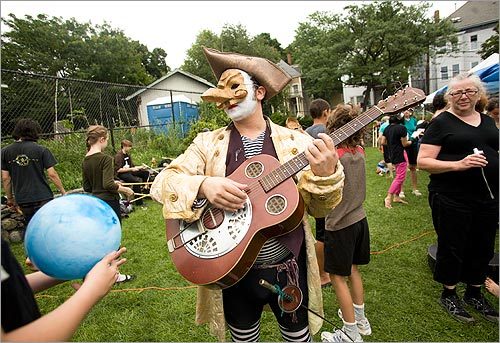
Photo by Erik Jacobs for The Boston Globe click here for full size.
Starting another summer teaching mime and commedia dell'art at the Somerville-based, Open Air Circus. This will be my sixth summer with the community-based youth circus and in addition to teaching, I am learning stilt-walking (and finding it surprisingly easy.)
There's still time to register for classes! Contact Peter Jehlen at peter_jehlen@openaircircus.org
Posted by
Ian Thal
at
6:58 PM
0
comments
![]()
![]()
Labels: commedia dell'arte, mime, Open Air Circus, teaching
Saturday, June 12, 2010
Henry V meets John Yoo for Fun and Torture
[N.B.Thomas Garvey's account of the same event is at The Hub Review.]
"What," you might ask me, "would bring you of all people to a Federalist Society function?" What if I told you that the function was co-sponsored by Commonwealth Shakespeare Company that it was a staged-reading of Henry V followed by a panel discussion entitled "Shakespeare's Henry V And The Law And War" featuring former White House Chief of Staff, Andrew Card, and former Deputy Assistant Attorney General, John Yoo who is generally credited with authoring the memos that are now seen as laying the legal groundwork for the Bush administration's use of torture?
The Federalist Society is an association founded by conservative and libertarian lawyers and judges associated with the Reagan administration. Their rallying cry is "original intent" (or as Yoo would tellingly joke in the panel discussion, "Our original intent." A quick look at the list of participants made it very clear that the evening's agenda would likely be using Shakespeare's play to validate the Bush administration's wartime record.
Of course, when Commonwealth Shakespeare Company director Steven Maler last staged Henry V it was in 2002, in the wake of the 9/11 attacks. The framing narration was set in the London tube during the Battle of Britain, when the underground doubled as a public bomb shelter for the people of London seeking refuge from German bombs and rocket attacks:

The narrator was a glamourous woman in green who tells the story of King Harry's victory in Agincourt to reassure a little boy who fled underground while still in his pajamas that Britain and its allies will ultimately emerge victorious over the Germans:

So given the time, when many Americans were still reeling from the September 11 attacks, and political consensus had not yet been rattled by the morass that emerged in Iraq, the allegory that director Steven Maler was presenting was clear: King Harry's multinational army (which is presented as including English, Scots, Welsh, and Irish) were standing in for the Allied forces who fought the Axis powers during World War II, who in turn, were standing in for the multinational North Atlantic Treaty Organization forces who were deploying against al-Qaeda and their Taliban supporters in Afghanistan. Never mind that Harry's claim on France was probably as dubious as Germany's claim on the Sudatenland, Silesia, Alsace-Lorraine, and other parts of Europe that were incorporated into Großdeutschland. That's the problem with allegories: they start to break down once one extends them too far.
It was probably the most brilliant piece of political propaganda I had seen on stage. That this is not a criticism: Henry V, like all of Shakespeare's histories, contain elements of propaganda. This was just the most effective use I had seen of those elements. Contrarily, Actors' Shakespeare Project more intimate 2008 production which had been staged after pubic dissatisfaction with the Iraq war was widespread, gave greater emphasis on the hard lives of the soldiers than on Henry's heroic status (though it was also the most effective performance of the courtship of Henry and Katherine I've seen-- but maybe that's just because Molly Schreiber rocks. Disclosure: I frequently usher for ASP.)

"How did you like the play, Mister Thal?" The text was dramatically cut to only a little more than an hour, but that was just as well as Thomas Garvey noted lawyers don't make very good actors. They were mostly adequate in the chorus but lacked the ability to present characters or hint at subtext, something most actors seem to be able to do even when reading cold. Former Lieutenant Governor Kerry Healey was actually somewhat amusing as Princess Katherine (she had played the role before.) Senior Vice President of Raytheon and former Associate Attorney General (2001-2002) seemed to be cast as King Henry largely due to his physical resemblance to George W. Bush: As we will see, the George and Henry comparisons would never end, though they seemed pretty much limited to the idea of a ne'er-do-well son of a political dynasty ascending to power despite most observers' low expectations and then starting a war. Oh yes, did I mention the dubious causae belli? Actually, none of the panelists made any of explicit comparisons, they only encouraged me to free-associate.
In his remarks, Bernard Dobski of Assumption College noted that Henry rejected Christian just war theory in his formulation of his causae belli as well as in many of his wartime actions (though he left out that he received approval from the Church to make unprovoked war) and made some non-argument that Henry was upholding the dignity of the law even as he was acknowledging the "incompleteness" of the law. Dobski forgot that in the play, the Church appears to have abandoned just war theory as well.
Michael Avery, in his role as the panel's token left-winger, suggested that Shakespeare should write a play called George II about a monarch who claims the power of the unitary executive, that no treaty or domestic law puts limitations on a president's war powers while making hypothetical claims of weapons of mass destruction, with Colin Powell in the role of the hero. David Hare already wrote that play: it's called Stuff Happens. Avery then pointedly addressed John Yoo by noting that when one wars upon the Constitution one wars upon the country. This an added extraordinary level of irony to Andrew Card's earlier fantasia of George W. Bush thinking about his Presidential Oath of Office on September 11, 2001 after he told Bush that the country was under attack:
I do solemnly swear (or affirm) that I will faithfully execute the Office of President of the United States, and will to the best of my ability, preserve, protect and defend the Constitution of the United States.Republicans have problems with irony.
Yoo had apparently also never heard of David Hare and suggested a sequel entitled Obama I in which George II's successor loses all of his predecessor's gains (by contrast, Andrew Card would prove to be more charitable, applauding President Obama's intellect and ability to make decisions based on intelligence reports that, as president, he receives on a daily basis). Before I go into the details of John Yoo's arguments, let me note how disappointed I was with his performance. I had been expecting him to have a coherent legal theory, but instead he seemed to be relying the idea that we in the audience was not paying close attention, he also seemed not to have understood the play and generally had problems distinguishing between a 16th century dramatization of 15th century politics and 21st century political reality. Card had similar problems but, he's an apparatchik and not an academic.
Yoo rather anachronistically appeared to view Harry's seeking Church permission to wage war on France as George Bush's moral authority to wage war over and against any objections from the international community. Yoo seemed to miss that the Archbishop of Canterbury and the Bishop of Ely do not make any moral claims, but rather support Henry's belligerance out of their own political interests, and furthermore: the Church they represent was the equivalent of the international community. Yoo will continue to talk of morality above the law as justification for Henry and George's decisions to flaunt both jus ad bellum and jus in bello in the interest of political expediency. He expanded on this by pointing out the inability of the international community today embodied by the United Nations to represent a universal morality when many of the nations are dictatorships. Instead of insisting that the international community be held to higher standards Yoo took the sophistic position of moral nihilism. Despite Henry's threats to the citizens of Harfleur, Yoo continues to claim Henry fights on behalf of morality:
If not, why, in a moment look to seeMoral nihilism goes beyond the realm of simple amoralism in that it makes continual reference to the language of morality, i.e. Yoo's call for a morality that is above the amoral standards of the international community while endorsing the claim that no moral standard, not even the moral standards of the United States as embodied in U.S. laws, should bind the President and even argues on behalf of specific actions that arguably have no practical purpose: like torturing children. I would be tempted to call John Yoo the "Noam Chomsky of the right" in light of Chomsky's own morally nihilistic apologetics for genocide, terrorism, and genocide denial, except that Chomsky is really little more than a self-aggrandizing cult-leader, and John Yoo is a moral nihilist with political influence.
The blind and bloody soldier with foul hand
Defile the locks of your shrill-shrieking daughters;
Your fathers taken by the silver beards,
And their most reverend heads dash'd to the walls,
Your naked infants spitted upon pikes,
Whiles the mad mothers with their howls confused
Do break the clouds, as did the wives of Jewry
At Herod's bloody-hunting slaughtermen.
What say you? will you yield, and this avoid,
Or, guilty in defence, be thus destroy'd?
(III.iii 33-43)
[Doug Cassel asked]"If the president deems that he's got to torture somebody, including by crushing the testicles of the person's child, there is no law that can stop him?"Of course, in the interests of the "civility" that the Federalist Society maintains for its panel discussions, the act of crushing children's testicles wasn't discussed, while the sadomasochistic techniques seen at Abu-Ghraib were only alluded to and waterboarding, whose use by the Spanish Inquisition was widely condemned by 16th century English writers (Shakespeare's contemporaries) as barbaric, was only mentioned in passing.
"No treaty," replied John Yoo.
 Card and Yoo were clearly focussed on a defense on the Bush administration's wartime record. Both of them using the September 11, 2001 attacks as the causae belli for the 2003 invasion of Iraq. Insisting that the threat of terrorism had changed the rules. Thus Card engaged in apologetics for the "are you with us or against us" doctrine noting that the invasion of Iraq was necessitated by Iraq not being "with us." Of course, Card was rewriting history: Iraq had already caved in to international pressure and had permitted UN arms inspectors to return, the Coalition invasion of Iraq was done before the arms inspectors could finish their job and was without regard to what they had not discovered. Speaking of writing history, they also frequently evoked the war records of Abraham Lincoln and Franklin Delano Roosevelt as giving legitimacy to Bush policy. Note: Lincoln and Roosevelt were demonstrably, highly effective war-time presidents who also did perceive limits on even their most controversial exercises of power while neither case can be made for Bush. Defense attorney J.W. Caney Jr., who had played Fluellen, raised the point that the measure of a society's justice system is how it treats those whom the society despises,but ultimately, neither Bush administration veteran could make the case that either the particular acts of the administration: invasion without a justifiable causae belli, the use of torture, extraordinary rendition, or the theory of the unitary executive who is above and not bound by treaties, laws, or the Constitution he is sworn to defend was actually needed in order to defend democratic societies from either foreign nation states or terrorists. All they could say was that the world had changed after 9/11 and unreflectively enlist a misreading of a truncated version of Henry V to support their thesis.
Card and Yoo were clearly focussed on a defense on the Bush administration's wartime record. Both of them using the September 11, 2001 attacks as the causae belli for the 2003 invasion of Iraq. Insisting that the threat of terrorism had changed the rules. Thus Card engaged in apologetics for the "are you with us or against us" doctrine noting that the invasion of Iraq was necessitated by Iraq not being "with us." Of course, Card was rewriting history: Iraq had already caved in to international pressure and had permitted UN arms inspectors to return, the Coalition invasion of Iraq was done before the arms inspectors could finish their job and was without regard to what they had not discovered. Speaking of writing history, they also frequently evoked the war records of Abraham Lincoln and Franklin Delano Roosevelt as giving legitimacy to Bush policy. Note: Lincoln and Roosevelt were demonstrably, highly effective war-time presidents who also did perceive limits on even their most controversial exercises of power while neither case can be made for Bush. Defense attorney J.W. Caney Jr., who had played Fluellen, raised the point that the measure of a society's justice system is how it treats those whom the society despises,but ultimately, neither Bush administration veteran could make the case that either the particular acts of the administration: invasion without a justifiable causae belli, the use of torture, extraordinary rendition, or the theory of the unitary executive who is above and not bound by treaties, laws, or the Constitution he is sworn to defend was actually needed in order to defend democratic societies from either foreign nation states or terrorists. All they could say was that the world had changed after 9/11 and unreflectively enlist a misreading of a truncated version of Henry V to support their thesis.
Posted by
Ian Thal
at
9:41 PM
5
comments
![]()
![]()
Labels: Andrew Card, commonwealth shakespeare company, federalist society, George W. Bush, Henry V, Iraq, John Yoo, Shakespeare, steven maler, torture, World War II
Launcelot Gobbo, Old Gobbo and Les Gobbi, Part 2
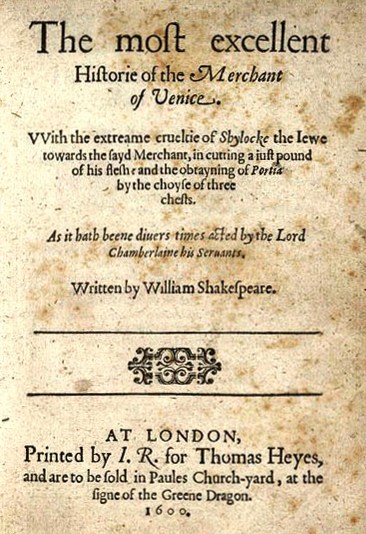 After discovering that Jacques Callot had illustrated a series of sketches of a troupe of dwarf actors and musicians known as Les Gobbi I naturally wondered "what connection might exist between this troupe and the characters of Old Gobbo and Launcelot Gobbo from The Merchant of Venice?" Though the possible connection certainly supports directors and dramaturgs to making some unconventional casting decisions, I confess that my speculation was not vigorously supported by the evidence, as Callot clearly made the illustrations long after the publication of The Merchant of Venice and I had no evidence as to how long the troupe had existed or if an earlier version of the troupe could have been known in England.
After discovering that Jacques Callot had illustrated a series of sketches of a troupe of dwarf actors and musicians known as Les Gobbi I naturally wondered "what connection might exist between this troupe and the characters of Old Gobbo and Launcelot Gobbo from The Merchant of Venice?" Though the possible connection certainly supports directors and dramaturgs to making some unconventional casting decisions, I confess that my speculation was not vigorously supported by the evidence, as Callot clearly made the illustrations long after the publication of The Merchant of Venice and I had no evidence as to how long the troupe had existed or if an earlier version of the troupe could have been known in England.
However, the Victoria and Albert Museum has in its collection a set of porcelain figures based on Callot's illustrations of Les Gobbi, and their website stated that these "grotesque dwarf entertainers" performed at the Medici court.
I checked the index of Pierre Louis Duchartre's classic work on the history of the commedia dell'arte, The Italian Comedy and found no reference to Les Gobbi, though other troupes of the era are mentioned. Of course Duchartre has some bizarre discomfort with the more vulgar elements of the commedia dell'arte, and might have been tempted to disregard a troupe who could be described as "grotesque" no matter how popular, even if, as the illustrations indicate, at least some of them were masked actors.
John Russell Brown, in his introduction to the Arden edition of The Merchant of Venice also notes that:
John Florio's Italian dictionary, A World of Words (1598), gave "Gobbo, crook-backt. Also a kind of faulkon."Though A World of Words was likely published after Shakespeare had composed and produced The Merchant of Venice there is some indication that even in England of the 1590s that "gobbo" was used as a term of derision for those with hunched or crooked backs, at least amongst those who had some passing familiarity with Italian. I know Shakespeare well enough to know that he did not shy away from vulgarity, or anything that our 21st century liberal ears would find too cruel to utter in polite society-- and certainly some of Callot's Gobbi are "crook-backt." Of course, there is also some possibility that Shakespeare and Florio were acquaintances and shared a fondness for insults.
Brown also offers the countering hypothesis that since the first quarto often renders "Gobbo" as "Iobbe" (spelling was not standardized back in 1600) that perhaps Shakespeare intended to provide an Italianized form of the Biblical Job. To me, this is doubtful, as the strongest Biblical allusion related to the Gobbi is that of Isaac and Jacob both in terms of Launcelot's tricking his blind father, as Jacob tricked his blind father, and Launcelot's prolific nature which is a somewhat comic parallel to Jacob's own fathering of the Twelve Tribes of Israel (and let us not forget the pun in the younger Gobbo's name: "Lance-a-lot.") If anything, the rendering as "Iobbe" should be taken less as a literary allusion than a hint for how the name should be pronounced on stage.
Knowing Shakespeare, and knowing that The Merchant of Venice was seen by his company and his audiences as a comedy, I'm more inclined to buy the idea that Shakespeare meant Launcelot Gobbo to be understood as "promiscuous crook-backed fellow" and not as some non-existent allusion to Job, the most tragic book in Jewish scripture.
Still, I have no evidence supporting the Callot connection, but given the utter silliness of Brown's Job hypothesis I am amazed I've not come across anyone else making a connection between Les Gobbi of Shakespeare and Callot.
Posted by
Ian Thal
at
7:53 PM
2
comments
![]()
![]()
Labels: commedia dell'arte, Gobbo, Jacques Callot, Merchant of Venice, Pierre Louis Duchartre, Shakespeare
Saturday, May 29, 2010
Launcelot Gobbo, Old Gobbo and Les Gobbi
In a recent conversation with my friend Cherie Konyha Greene about her trip through Italy to research a historical novel, we found ourselves asking "where did Shakespeare get the name for Launcelot Gobbo?" Cherie had found references to "Il Gobbo di Rialto" a statue of a hunched figure in front of the Church of San Giacomo di Rialto: The statue served as a podium for official proclamations and also had a role in the punishment of misdemeanours in that the guilty party would run naked through a gauntlet in the Rialto until kissing the statue. The wikipedia article makes some note that the statue may have inspired Launcelot Gobbo and Old Gobbo from the Merchant of Venice but does not suggest a rationale for drawing the connection, beyond the name "Gobbo" and the city of Venice.
The statue served as a podium for official proclamations and also had a role in the punishment of misdemeanours in that the guilty party would run naked through a gauntlet in the Rialto until kissing the statue. The wikipedia article makes some note that the statue may have inspired Launcelot Gobbo and Old Gobbo from the Merchant of Venice but does not suggest a rationale for drawing the connection, beyond the name "Gobbo" and the city of Venice.
When I did my own looking about I discovered that "Gobbo" is both a surname as well as a vernacular term for "hunchback." This was more promising as there is a long association with physical deformities and comedy. The Gobbi are, after all, the clown characters in the play.
Then came my most promising discovery: Jacques Callot (c. 1592–1635) was a print-maker from Nancy, who worked in the Medici court in Florence. He is of special interest to commedia dell'arte artists, scholars, and enthusiasts, because he created a dynamic series of prints of commedia actors that continue to be used as reference points for the masks, costumes, and physicality of the characters. He also created a series of prints entitled Les Gobbi:
 This first character, by all appearances, has the physical proportions we now associate with dwarfism. Some might attribute these proportions to some sort of grotesque caricature, but if one looks closely at the face, it is apparent that this violin playing Gobbo is wearing a mask: there are eye holes and the edge of the mask is clearly demarcated.
This first character, by all appearances, has the physical proportions we now associate with dwarfism. Some might attribute these proportions to some sort of grotesque caricature, but if one looks closely at the face, it is apparent that this violin playing Gobbo is wearing a mask: there are eye holes and the edge of the mask is clearly demarcated.

This one, playing a flute, does appear to be hunchbacked, but is also wearing a mask, (note again the eye-holes and the edge.)
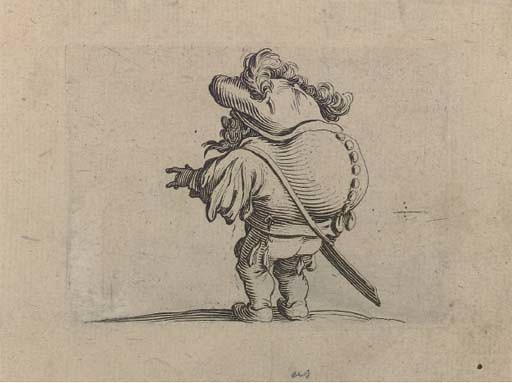 Here we have another with a hunchback, but he is flamboyantly dressed and carries a sword. Probably not a soldier, but quite likely an actor.
Here we have another with a hunchback, but he is flamboyantly dressed and carries a sword. Probably not a soldier, but quite likely an actor.
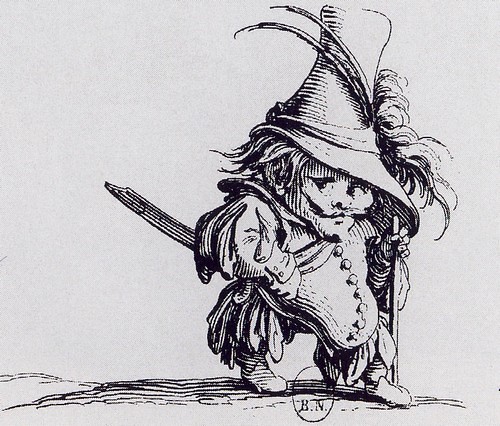 Again, flamboyant dress and a sword. Which again makes me think that this Gobbo is an actor.
Again, flamboyant dress and a sword. Which again makes me think that this Gobbo is an actor.
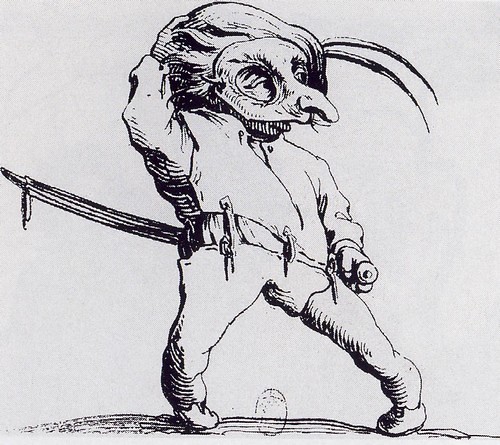 This one is certainly a comedian. Note the mask, the comic stance, the clothes barely holding together, a sword longer than the wielder is tall, a comically visible erection and "package," and a phallic nose, and we have either Il Capitano, or a zanni recently conscripted into an army.
This one is certainly a comedian. Note the mask, the comic stance, the clothes barely holding together, a sword longer than the wielder is tall, a comically visible erection and "package," and a phallic nose, and we have either Il Capitano, or a zanni recently conscripted into an army.
Obviously, this is just preliminary research. Was Callot drawing inspiration from an actual troupe of dwarf actors and musicians known as Les Gobbi? Or are these simply figures from his imagination? Callot was a child when Shakespeare composed The Merchant of Venice (believed to have been written sometime between 1596 and 1598; first quarto published in 1600), could the Gobbi that Callot illustrated have been the second generation of a troupe from which Shakespeare took the name "Gobbo"? After all, the commedia troupes were often family businesses, and some of them did travel to England.
Not only does this tie in to my not-very-controversial intuition that links Shakespeare's Gobbi with the zanni of the Italian comedy (in particular, Arlecchino) but if any of the answers to the above questions are "yes" then there's a strong argument to specifically cast dwarf actors in the roles of Launcelot and Old Gobbo.
N.B.: I've posted an imaginatively titled follow-up: Launcelot Gobbo, Old Gobbo and Les Gobbi, Part 2.
Posted by
Ian Thal
at
6:01 PM
0
comments
![]()
![]()
Labels: Cherie Konyha Greene, commedia dell'arte, Gobbo, Jacques Callot, Merchant of Venice, Shakespeare
Monday, May 10, 2010
May 14th: Commedia Teatro presents Ian Thal @ Outpost 186
Or: I haven't the time to design a new poster because the show must go on!
Back in 2004, I met Jonathan Samson, who had the mad idea to create a commedia dell'arte inspired television series. This led to a rather intense period of working and playing together over a period of several weeks. Then Jonathan left for Thailand, planning to stay but for a few months, instead, he stayed and founded Thailand's first commedia troupe: Commedia del Siam! Several years later, we got to talking about doing some shows together when he is back in the states. We try to get a few gigs together and then on the on the facebook page for one of those gigs, Jonathan writes:
I'm gonna have to be there in spirit only! My transportation to Boston has been impeded by political rioting in Bangkok, the volcanic eruption in Iceland, and the poor global economy. Ian will be producing and directing a wonderful commedia show by himself... and I am so jealous that all of you are gonna get to see it live!
The room has been paid for, so the show must go on! Here's the poster anyway:
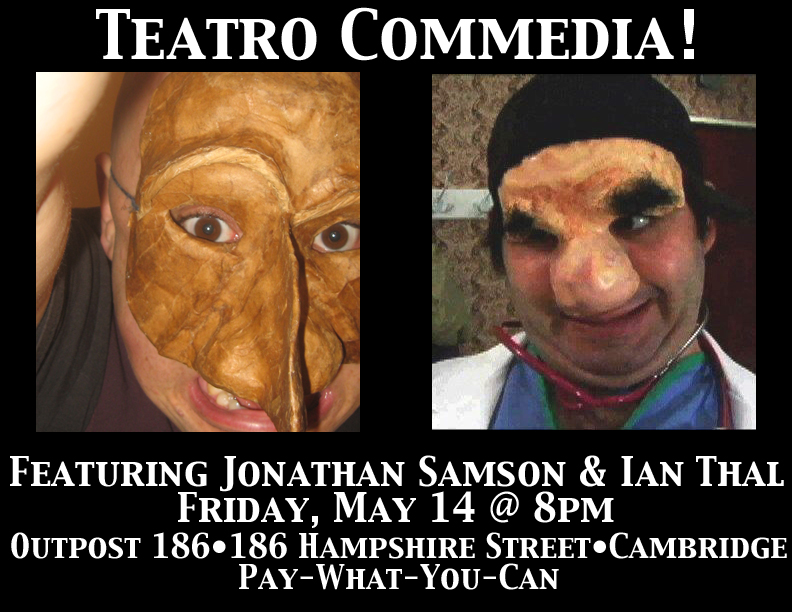
I shall be performing a short bill of:
O, Mister Sun, Don't You Fall Asleep On Me (corporeal mime and mask)
The Marmalope (mime)
Arlecchino Am Ravenous (commedia dell'arte)
The event is Friday, May 14th at 8pm
Outpost 186
186 Hampshire Street
Inman Square
Cambridge MA
View Larger Map
Posted by
Ian Thal
at
9:42 PM
0
comments
![]()
![]()
Labels: arlecchino, commedia dell'arte, corporeal mime, Jonathan Samson, Outpost 186, performance
Tuesday, April 20, 2010
Belated Photographs from Commedia dell'Arte Day Presentation
[Yes, it was nearly two months ago, but I as mentioned before, blogging takes a back seat to the passing of a beloved cat.]
On February 25th, I gave a presentation for World Commedia dell'Arte Day after Orfeo Group Theatre's production of Pierre Marivaux' The Island of Slaves. I packed my masks, along with three that were loaned to me by Eric Bornstein of Behind the Mask. Eric had been invited to present, but had a prior commitment so he recommended me to go in his place (thanks, Eric!)
Judith Chaffee (visit her Commedia dell'Arte Website) was also scheduled to present, but was unable to make it. So it was up to me. Thankfully, between performing and teaching, I've gotten quite a few ideas about what commedia means to me.
Besides introducing some of the masks, I also demonstrated some of the physical postures of the characters. Photographs courtesy of Cherie Konyha Greene unless otherwise noted.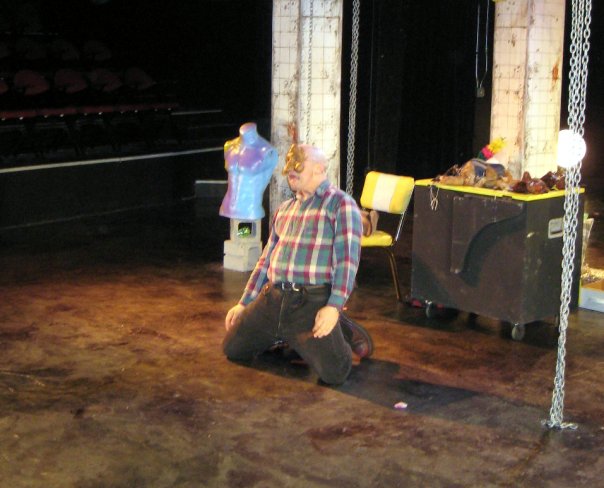 To quote Cherie: "I'd have liked to get more shots of Ian's Arlecchino--but he moves too fast for my camera. As an Arlecchino should."
To quote Cherie: "I'd have liked to get more shots of Ian's Arlecchino--but he moves too fast for my camera. As an Arlecchino should."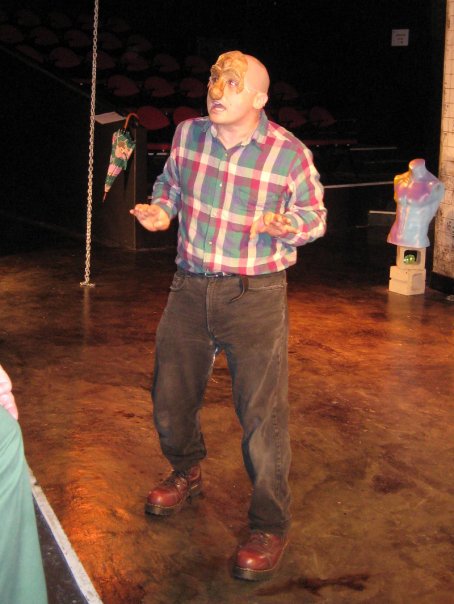 Il Dottore has a someone different approach to filling his belly than Arlecchino.
Il Dottore has a someone different approach to filling his belly than Arlecchino.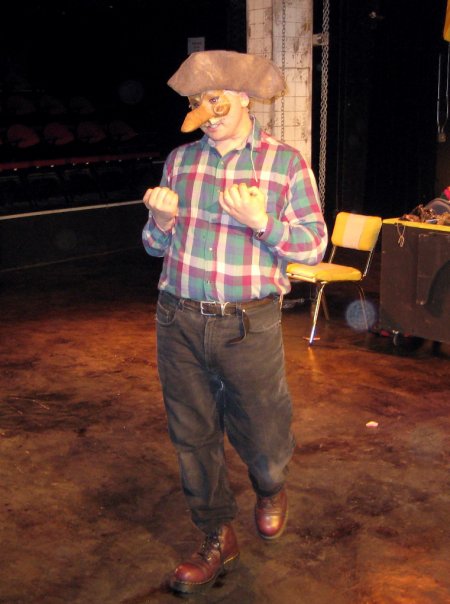 Il Capitano, by contrast, is seeking to fill something else, or as he said to one audience member: "This is not rain. It is the angels weeping because I have forsaken them for you."
Il Capitano, by contrast, is seeking to fill something else, or as he said to one audience member: "This is not rain. It is the angels weeping because I have forsaken them for you." The red mask at center is Eric Bornstein's interpretation of Il Capitano. Eric did this mask in leather, mine is in papier-mâché.
The red mask at center is Eric Bornstein's interpretation of Il Capitano. Eric did this mask in leather, mine is in papier-mâché. Amanda J. Collins, who had been playing Cleanthis earlier in the evening, wearing one of Eric's Arlecchino masks. This one is in leather.
Amanda J. Collins, who had been playing Cleanthis earlier in the evening, wearing one of Eric's Arlecchino masks. This one is in leather. Once again, as Il Capitano. Photo courtesy of Orfeo Group.
Once again, as Il Capitano. Photo courtesy of Orfeo Group.
Photostream (including more photos) starts here
In addition to Orfeo and Behind the mask, I want to thank Associazione SAT and Faction of Fools for declaring and organizing World Commedia dell'Arte Day!
Posted by
Ian Thal
at
1:22 PM
0
comments
![]()
![]()
Labels: Amanda J. Collins, Associazione SAT, Behind the Mask, Cherie Konyha Greene, commedia dell'arte, Eric Bornstein, Faction of Fools, Orfeo Group
Saturday, April 3, 2010
Belated Post-Reading Report
The March 28th reading was as rewarding as was stressful. As with the previous reading in October, I had had a few roles to recast, but I was also still dealing with the loss of my cat, Omi, who had been my companion for some 16 years. Grief has a way of putting one off schedule.
Then, as my plans finally came together with roles being cast only days before the reading, more chaos ensued. Stage manager Anika Hannibal-Colvin, who had been a valued assistant in the previous two readings fell ill, and Dan Schneider had an emergency to deal with on the day of the show. I was able to appoint Trudi Goodman to be stage manager since she she was reading a minor role that was only needed for a single scene, and she appointed me the understudy and so, I played the role of Jonah, especially strange since my plan was to sit in the back of the room and take notes.
The talk-back after the reading was particularly helpful. Both Thomas Garvey and Art Hennessey were in the audience and had a lot of useful observations as to how the dramatic potential could be better exploited (Art promised me some notes!) A recurring issue with the current draft as I would see with the feedback was that many dramatic turns near the end were left to inuendo, and not made explicit and therefore missed by the audience. In situations like that, it's the playwright, not the audience who is at fault.
As most of my actors were returnees, they seemed more comfortable than before in speaking candidly with me about both the performances and the script (both in terms of the current draft and the over all development)-- something which has continued in email conversations over the following couple of days in which I had superb dialogue with several cast members. I found myself in one exchange citing Adam Szymkowicz' recent interview of playwright Paul Mullin, when asked for advice to playwrights, Mullin said:
Understand the tradition you have joined. Never cede your place in the hierarchy. Directors did not come into existence until the 19th Century. Artistic directors not until the 20th. Only actors outrank you in seniority in the tradition. So treat them with respect. In fact, act on stage as often as you can...Very good advice, I think.
The following day I received a letter in the post from a literary director, who after reading a ten-page sample was soliciting the full length script. Obviously, I can't name names since no commitment has been made, but sometimes the reward for hard work is simply to be encouraged to go back to work.
Posted by
Ian Thal
at
6:25 AM
2
comments
![]()
![]()
Labels: acting, Adam Szymkowicz, Art Hennessey, Paul Mullin, theatre, thomas garvey, total war, writing
Friday, March 26, 2010
Cast for March 28th Staged Reading of "Total War"
Posted by
Ian Thal
at
11:10 AM
0
comments
![]()
![]()
Labels: Andrew Gerst, Anika M. Colvin-Hannibal, dan schneider, James Bocock, Kate Heffernan, kendall stewart, Martin Comack, Matthew Zahnzinger, savanah shaughnessy, Tom Sprague, total war, Trudi Goodman
